Education is evolving rapidly, with technology playing a key role. Chatbots have emerged as an engaging tool to supplement learning inside and outside the classroom.
But with so many chatbot options on the market, how do you identify the ideal one for your needs?
In this blog, we'll explore the top features to consider when selecting a chatbot for education..
We'll break down what matters, from content and curriculum support to student engagement and data analytics.
By the end, you'll clearly understand what an educational chatbot should be capable of and how it can enhance learning experiences. So join me in an in-depth exploration of chatbot features.
Chatbots: Your Digital Assistants
Chatbots are like your digital buddies, always ready to assist you in the virtual world. But what exactly are they? Well, think of chatbots as computer programs designed to simulate human conversation.
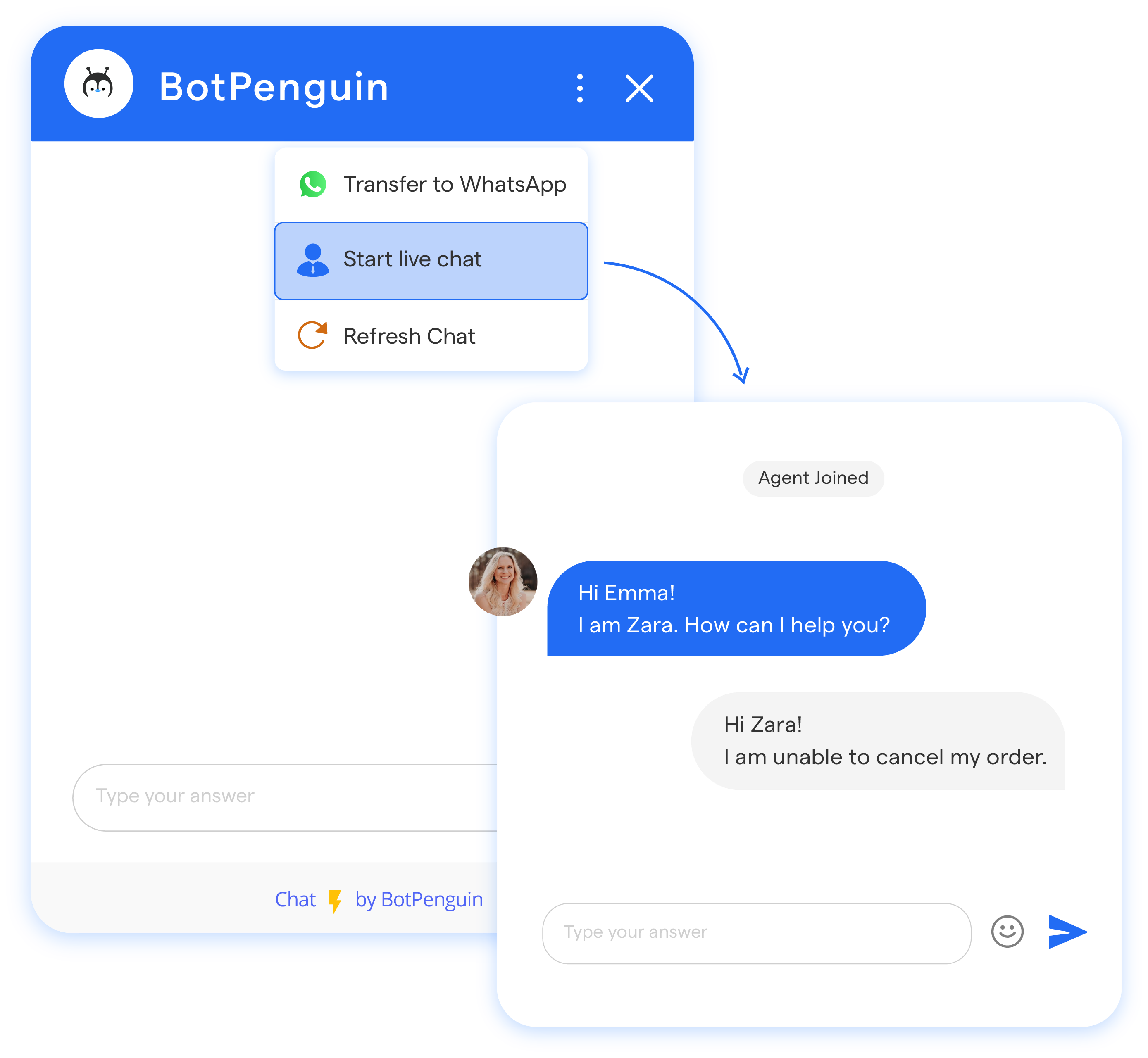
They use artificial intelligence (AI) and natural language processing (NLP) to understand and reply to user queries.
Now that we know what chatbots are let's explore why they are game-changers in education.
Let’s see the role of chatbots in education.
Why Use Chatbots in Education?
Education is evolving. New technologies are enhancing how students learn and teachers teach. Chatbots are one such innovative tool making waves in the classroom. With their engaging conversations, chatbots for education help bring lessons to life and spark curiosity in students.
Here are the key role of chatbot in education:
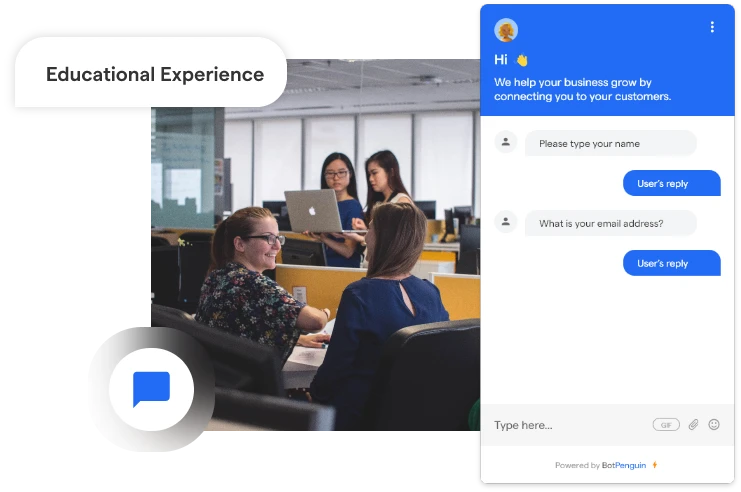
Enhancing Learning Outcomes
Chatbots have been shown to improve learning outcomes significantly. Personalized feedback, adaptive learning experiences, and targeted resources help students grasp concepts more effectively and achieve better results.
Tailored Support
Every student has a different learning pace. Chatbots can cater to these individual needs by offering personalized support and guidance.
Whether providing additional explanations, suggesting relevant study materials, or offering practice quizzes, chatbots ensure each student receives the attention they deserve.
Accessibility for Diverse Learners
Inclusive education is crucial, and chatbots are vital in making education accessible to all. They can support students with disabilities, language barriers, or learning difficulties.
By offering alternative formats, translations, or visual aids, chatbots ensure that every student can participate and thrive in the learning process.
Now that we understand the role of chatbots in education let's select the perfect chatbot for your educational needs.
Choosing the Right Chatbot for Education
In this section, we’ll see the important factors for choosing the right chatbot education.
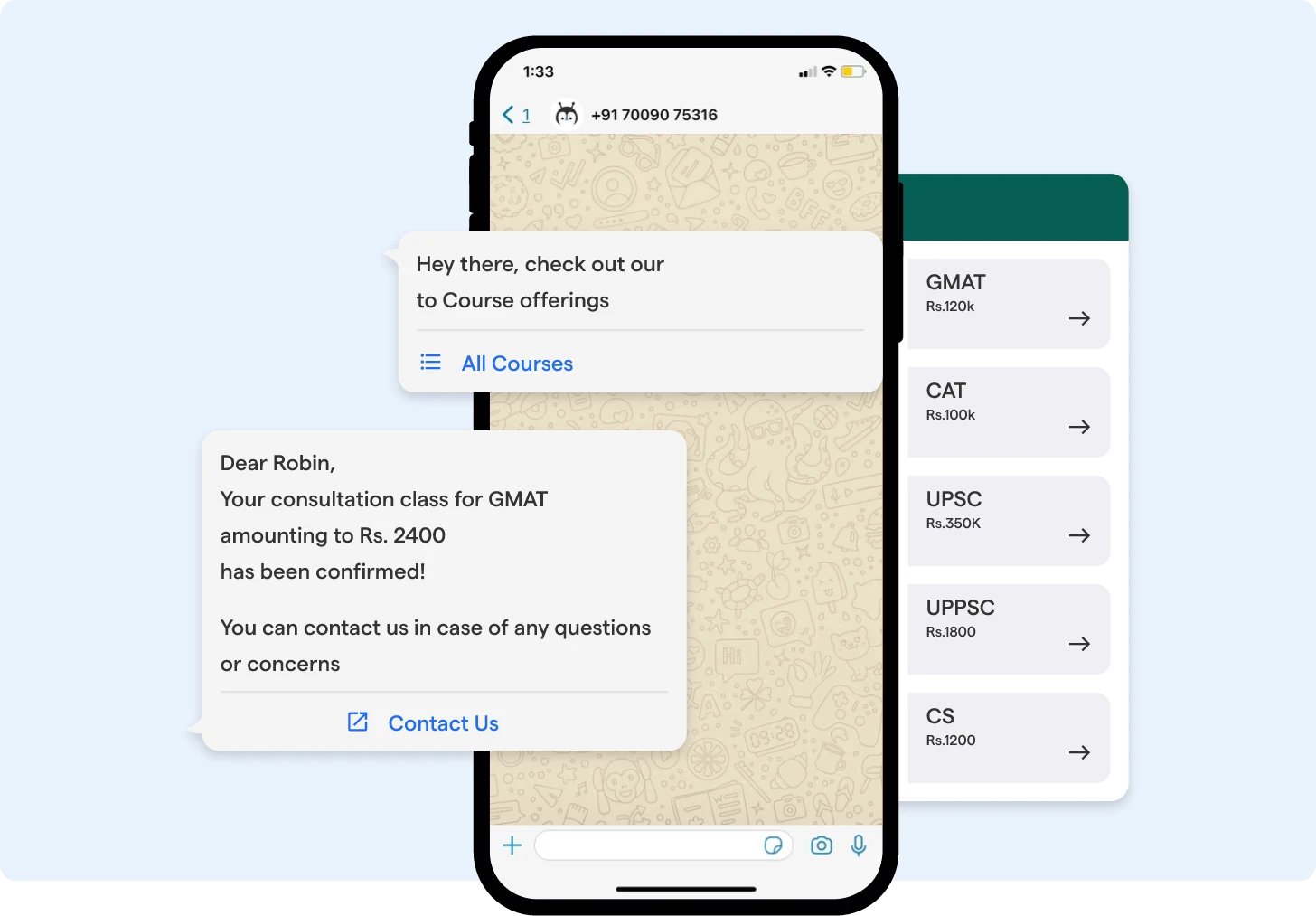
Identifying Educational Goals and Needs
Before choosing a chatbot for education, it's essential to identify your educational goals and needs. Determine what you want to achieve with the chatbot and the specific areas where it can provide support.
Whether improving student engagement, streamlining administrative tasks, or enhancing personalized learning, clarifying your objectives will help you make an informed decision.
Assessing Chatbot Features and Capabilities
When evaluating chatbots for education, consider their features and capabilities. Look for chatbots that offer advanced natural language processing (NLP) and machine learning (ML) capabilities.
These technologies enable chatbots to understand and respond to user queries more effectively.
Additionally, check if the chatbot can integrate with your existing systems, provide multilingual support, and offer customization options to align with your unique requirements.
Considering User Experience and Interface Design
User experience plays the main role in the success of a chatbot. Ensure that the chatbot has a user-friendly interface and intuitive navigation.
It should be easy for both students and educators to interact with the chatbot and access its features. A visually appealing and engaging design can also enhance the overall user experience.
Evaluating Security and Privacy Measures
When dealing with sensitive educational data, security and privacy are paramount.
Ensure the chatbot platform follows industry-standard security protocols and complies with data protection regulations. Look for features like encryption, secure data storage, and user authentication to safeguard student and teacher information.
Choosing the Right Chatbot for Education
When choosing an educational chatbot, it's essential to consider the key features that will enhance the learning experience. Let's explore the must-have features to look for:
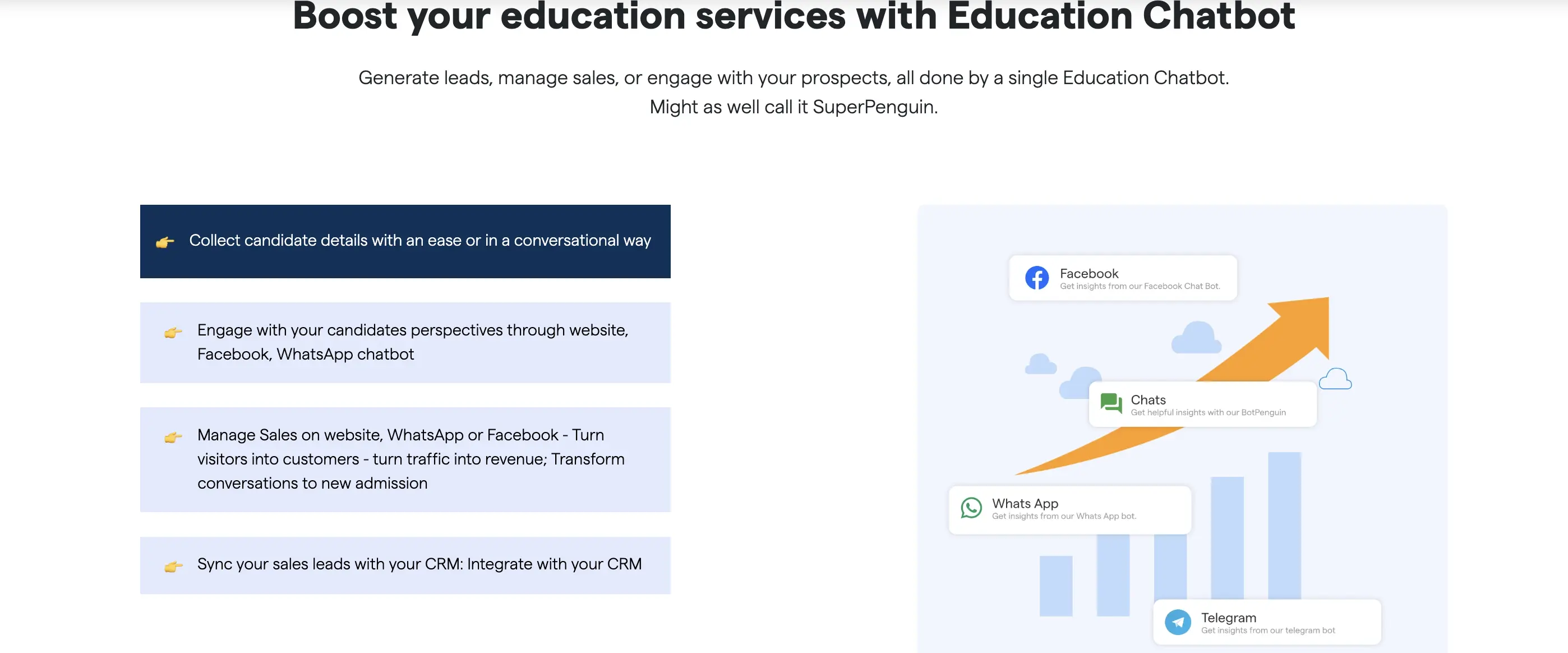
Adaptive Learning Capabilities
An ideal educational chatbot should have adaptive learning capabilities. This means that it can analyze student performance, identify areas of improvement, and offer personalized recommendations.
Adaptive learning ensures that students receive tailored support, whether it's suggesting additional resources, offering targeted practice exercises, or adapting the difficulty level of questions.
Intelligent Tutoring and Feedback
A chatbot acting as an intelligent tutor can make a difference in learning.
Look for a chatbot that can provide instant feedback on student responses, offer explanations for incorrect answers, and guide students through problem-solving steps. Intelligent tutoring helps students grasp concepts more effectively and promotes independent learning.
Content Delivery and Assessment
A robust educational chatbot can deliver educational content in various formats. Whether it's text-based explanations, multimedia resources, or interactive simulations, the chatbot should cater to different learning preferences.
Additionally, the chatbot should have assessment capabilities, allowing students to practice and receive feedback on their progress.
Progress Tracking and Analytics
To keep an eye on student performance and identify areas of improvement, a chatbot should have progress tracking and analytics features.
It should generate reports on student engagement, completion rates, and performance trends. This data can help educators make data-driven decisions and provide targeted interventions.
Multimodal Communication Options
A chatbot that supports multimodal communication can enhance the learning experience. Look for features like voice recognition, speech synthesis, and visual cues.
These options allow students to interact with the chatbot using their preferred mode of communication, making the learning process more inclusive and engaging.
After reading this now you may be thinking “how do I choose the one chatbot that offers all these amazing features” right?
You know we are going to share here a one top secret chatbot platform. When it comes to educational chatbots, BotPenguin stands out as the ideal choice. Let's explore why:
BotPenguin's Free Chatbot for Education: The Ideal Choice
BotPenguin offers a user-friendly and intuitive chatbot platform specifically designed for educational settings.
It combines advanced AI and NLP technologies to provide an interactive, personalized learning experience.
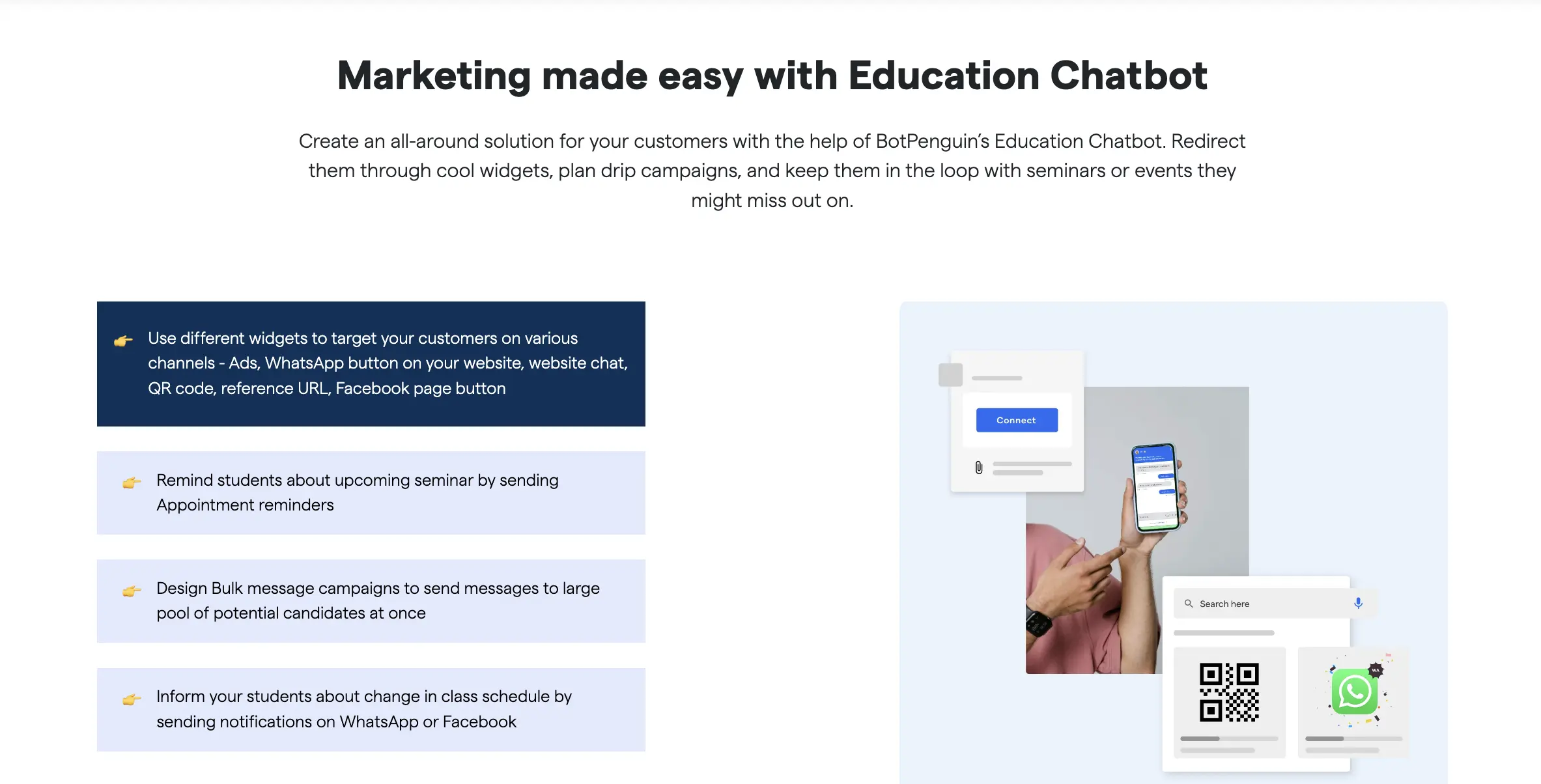
Features Specifically Designed for Education
BotPenguin's chatbot comes equipped with all the essential features for education. It offers adaptive learning capabilities, intelligent tutoring, content delivery in various formats, assessment options, and progress tracking.
With BotPenguin, students can receive personalized support and engage in meaningful conversations.
Benefits of Using BotPenguin's Chatbot in Education
By implementing BotPenguin's chatbot, educational institutions can enhance student engagement, provide personalized learning experiences, and streamline administrative tasks.
The chatbot's 24/7 availability ensures that students can access support whenever needed. Moreover, BotPenguin's chatbot is cost-effective and easy to implement, making it an ideal choice for educational institutions of all sizes.
Case Studies Showcasing Successful Implementations
BotPenguin's chatbot has been successfully implemented in various educational settings. Case studies highlight how institutions have improved student outcomes, increased engagement, and saved time and resources using BotPenguin's chatbot.
Now time to implement it on your website, and implementing a chatbot in an educational setting requires careful planning and execution. Let's explore the steps involved:
How to Implement a Chatbot in an Educational Setting?
Bringing technology to the classroom just got easier. With chatbots, teachers now have a helpful tool that students love. So, let’s see how to implement a chatbot in an educational setting:
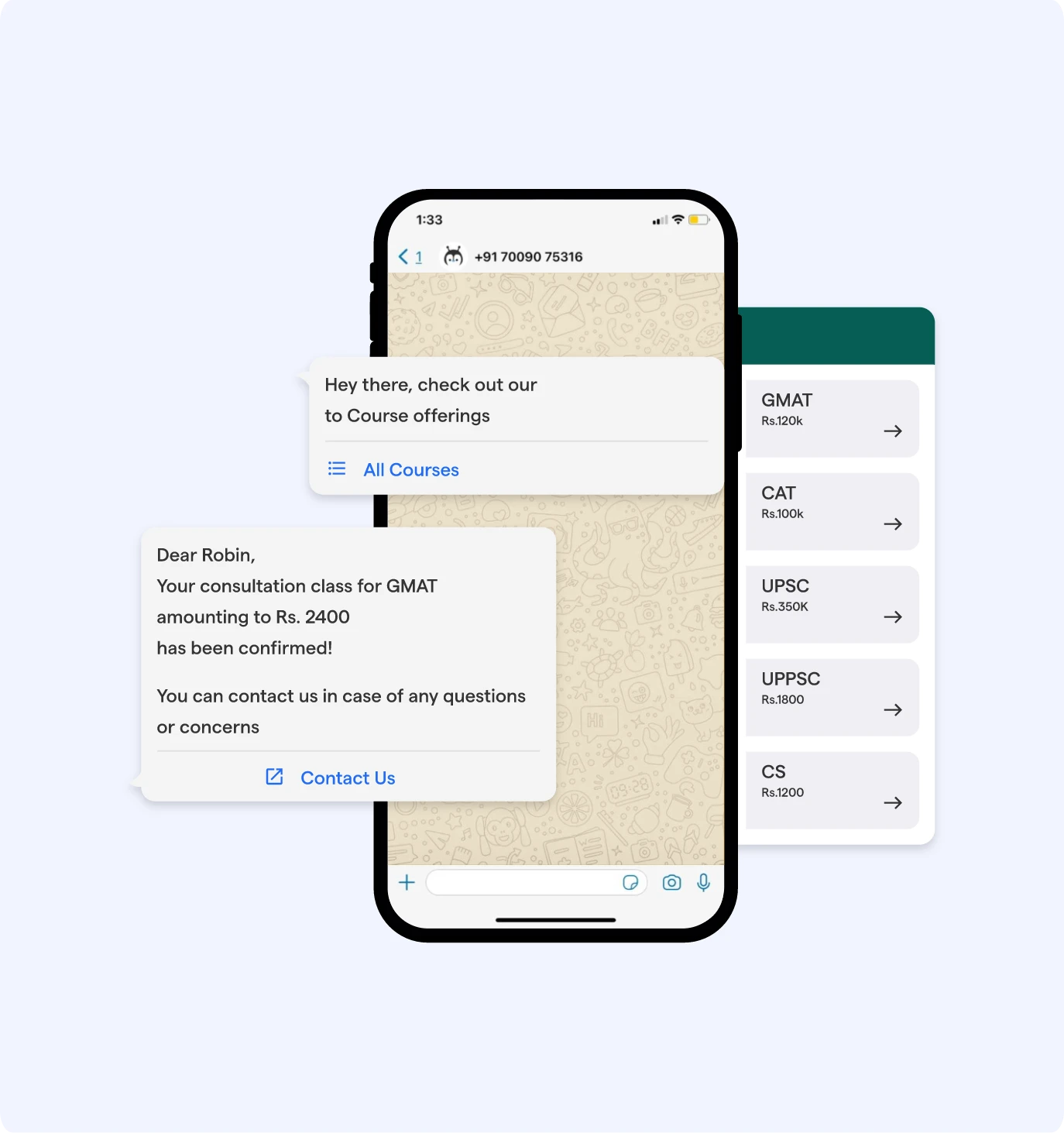
Step 1
Identifying Implementation Goals and Objectives
Before implementing a chatbot, clearly define your goals and objectives. Determine how the chatbot will support student learning, enhance teacher efficiency, or improve administrative processes.
This clarity will guide the implementation process.
Step 2
Selecting the Right Platform or Provider
Choose a chatbot platform or provider that aligns with your educational goals and requirements. Consider factors like ease of use, customization options, integration capabilities, and support services.
BotPenguin's chatbot platform, for example, offers a user-friendly interface, customization options, and seamless integration with existing systems.
Step 3
Customizing the Chatbot to Fit Specific Needs
Customize the chatbot to align with your institution's specific needs. Tailor the chatbot's responses, content delivery, and assessment features to match your curriculum and teaching style.
This customization ensures that the chatbot becomes integral to your educational ecosystem.
Step 4
Training and Onboarding Users
Provide training and onboarding sessions for teachers, students, and administrators to familiarize them with the chatbot's features and functionalities.
This training will ensure that users can maximize the benefits of the chatbot and feel confident in utilizing its capabilities.
Step 5
Monitoring and Evaluating the Chatbot's Performance
Regularly evaluate the chatbot's performance to ensure its effectiveness.
Collect user feedback, analyze usage data, and make necessary adjustments to improve the chatbot's functionality and user experience.
Conclusion
In conclusion, finding the ideal chatbot for education requires careful consideration of various factors. The search for the perfect educational chatbot demands a balance between technology and pedagogy.
Ultimately, the ideal educational chatbot should enhance learning experiences and outcomes. The quest for the best educational chatbot underscores the importance of user-centric design
BotPenguin's free chatbot platform offers all the must-have capabilities we discussed - from adaptive learning and intelligent tutoring to robust analytics and customization options. Its intuitive interface and seamless integration capabilities also ensure a smooth implementation process.
BotPenguin has successfully supported educational institutions of all sizes through personalized learning, increased engagement and administrative efficiency.
Don't just take our words for it - see for yourself by implementing BotPenguin's chatbot in your setting today. Your students will love learning with their new digital assistant, and you'll see firsthand how easily a chatbot can take your education goals to greater heights.
Frequently Asked Questions (FAQs)
What features should I look for in an educational chatbot?
When choosing an chatbot for education, consider features like adaptive learning capabilities, progress tracking, multimodal communication options, integration with existing systems, and a user-friendly interface.
Can chatbots replace human teachers in education?
Chatbots cannot replace human teachers entirely, but they can complement their role by providing personalized support and assistance to students.
Are chatbots cost-effective for educational institutions?
Yes, chatbots can be cost-effective for educational institutions as they can automate administrative tasks and provide scalable support to a large number of students.
How can chatbots enhance student engagement?
Chatbot for education can enhance student engagement by providing interactive and personalized learning experiences, offering immediate feedback, and promoting active participation.
Can chatbots provide personalized learning experiences?
Yes, chatbot for education can provide personalized learning experiences by analyzing individual learning patterns and preferences and delivering customized content and recommendations.


